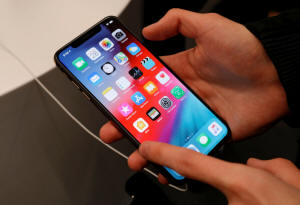Russia says US hacked thousands of Apple phones in spy plot
 Send a link to a friend
Send a link to a friend
 [June 02, 2023]
By Guy Faulconbridge [June 02, 2023]
By Guy Faulconbridge
MOSCOW (Reuters) - Russia's Federal Security Service (FSB) said on
Thursday it had uncovered an American espionage operation that
compromised thousands of iPhones using sophisticated surveillance
software.
Moscow-based Kaspersky Lab said dozens of its employees' devices were
compromised in the operation.
The FSB, the main successor to the Soviet-era KGB, said in a statement
that several thousand Apple Inc devices had been infected, including
those of domestic Russian subscribers as well as foreign diplomats based
in Russia and the former Soviet Union.
"The FSB has uncovered an intelligence action of the American special
services using Apple mobile devices," the FSB said in a statement.
The FSB said the plot showed "close cooperation" between Apple and the
National Security Agency (NSA), the U.S. agency responsible for
cryptographic and communications intelligence and security. The FSB
provided no evidence that Apple cooperated with, or had any awareness
of, the spying campaign.

In a statement, Apple denied the allegation. "We have never worked with
any government to insert a backdoor into any Apple product and never
will," the firm said in a statement.
The NSA declined to comment.
Kaspersky CEO Eugene Kaspersky said on Twitter that dozens of his
employees' phones were compromised in the operation, which his company
described as "an extremely complex, professionally targeted cyberattack"
that had targeted workers in "top and middle-management."
Kaspersky researcher Igor Kuznetsov told Reuters that his company had
independently discovered anomalous traffic on its corporate Wi-Fi
network around the start of the year. He said Kaspersky did not
circulate its findings to Russia's Computer Emergency Response Team
until earlier on Thursday.
He said he could not comment on Moscow's allegation that Americans were
responsible for the hacking or that thousands of others had been
targeted.
"It's very hard to attribute anything to anyone," he said.
In a blog post, Kaspersky said the oldest traces of infection it
discovered dated back to 2019. "As of the time of writing in June 2023,
the attack is ongoing," the company said. It added that while its staff
was hit, "we are quite confident that Kaspersky was not the main target
of this cyberattack."
The FSB said the American hackers had compromised diplomats from Israel,
Syria, China and NATO members in the espionage campaign.
[to top of second column]
|

A customer tests a smartphone during the
launch of the new iPhone XS and XS Max sales at "re:Store" Apple
reseller shop in Moscow, Russia September 28, 2018. REUTERS/Tatyana
Makeyeva

Israeli officials declined comment. Chinese, Syrian and NATO
representatives were not immediately able for comment.
U.S. SNOOPING?
The United States is the world's top cyber power in terms of intent
and capability, according to Harvard University's Belfer Center
Cyber 2022 Power Index, followed by China, Russia, the United
Kingdom and Australia.
Both the Kremlin and Russia's foreign ministry pointed to the
significance of the matter.
"The hidden data collection was carried out through software
vulnerabilities in U.S.-made mobile phones," Russia's foreign
ministry said in a statement.
"The U.S. intelligence services have been using IT corporations for
decades in order to collect large-scale data of Internet users
without their knowledge," the ministry said.
Russian officials said the plot had been uncovered as part of a
joint effort by FSB officers and those of the Federal Guards Service
(FSO), a powerful agency that runs the Kremlin bodyguard and was
also once the KGB's Ninth Directorate.
Officials in Russia, which Western spies say has constructed a very
sophisticated domestic surveillance structure, have long questioned
the security of U.S. technology.
Kremlin spokesman Dmitry Peskov said all officials in the
presidential administration knew that gadgets such as iPhones were
"absolutely transparent."
Earlier this year, the Kremlin told officials involved in
preparations for Russia's 2024 presidential election to stop using
Apple iPhones because of concerns that the devices are vulnerable to
Western intelligence agencies, the Kommersant newspaper reported.

(Writing by Guy Faulconbridge; Additional reporting by Raphael
Satter in Washington, James Pearson in London and Zeba Siddiqui in
San Francisco; Editing by Mark Potter, Andrew Heavens, Matthew Lewis
and Diane Craft)
[© 2023 Thomson Reuters. All rights
reserved.]This material may not be published,
broadcast, rewritten or redistributed.
Thompson Reuters is solely responsible for this content. |